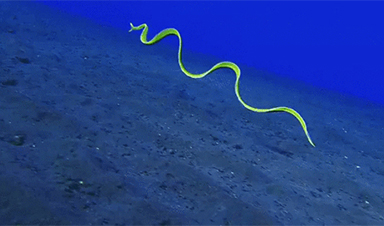Physicist Seth Fraden is developing a new generation of machines modeled on living creatures. His latest invention might one day treat disease by swimming its way through our blood.
As a kid, physicist Seth Fraden loved the movie “Fantastic Voyage,” about a microscopic submarine traveling through a human bloodstream. Almost 10 years ago, Fraden began a quest to create a robotic eel he could send on a similar journey, though it wouldn’t be for entertainment. The eel would be designed to deliver a drug to cells or genes. And, to capture the flexibility of the real sea creature, it would take the form of a gel that could glide through water.
Fraden recently announced he’d achieved the first couple of steps toward realizing his vision. In the journal Lab on a Chip, he reported that he and his team had created a model of a network of neurons using chemicals and microscopic containers. It’s this network that is primarily responsible for the eel’s trademark zigzag swimming motion.
Fraden next plans to embed his neural network in a gel. If everything goes as planned, the gel will actually move the same way an eel does while swimming.
The robotic eel is part of a larger effort by Fraden to build machines made from chemicals and other synthetic materials that behave like living organisms. “Animating inanimate matter” is how he describes it.
He’s not bringing inorganic matter to life. He’s building devices that act a lot like aspects and features of living creatures — clothing that mends itself using the same process our cells use to close a wound, for example, or nanobots that swim like fish through water pipes, carrying materials to repair pipe damage. Fraden’s artificial neural network is just the beginning.
Image Credit: BraneisNow
News This Week
Drug-Coated Neural Implants Reduce Immune Rejection
Summary: A new study shows that coating neural prosthetic implants with the anti-inflammatory drug dexamethasone helps reduce the body’s immune response and scar tissue formation. This strategy enhances the long-term performance and stability of electrodes [...]
Scientists discover cancer-fighting bacteria that ‘soak up’ forever chemicals in the body
A family of healthy bacteria may help 'soak up' toxic forever chemicals in the body, warding off their cancerous effects. Forever chemicals, also known as PFAS (per- and polyfluoroalkyl substances), are toxic chemicals that [...]
Johns Hopkins Researchers Uncover a New Way To Kill Cancer Cells
A new study reveals that blocking ribosomal RNA production rewires cancer cell behavior and could help treat genetically unstable tumors. Researchers at the Johns Hopkins Kimmel Cancer Center and the Department of Radiation Oncology and Molecular [...]
AI matches doctors in mapping lung tumors for radiation therapy
In radiation therapy, precision can save lives. Oncologists must carefully map the size and location of a tumor before delivering high-dose radiation to destroy cancer cells while sparing healthy tissue. But this process, called [...]
Scientists Finally “See” Key Protein That Controls Inflammation
Researchers used advanced microscopy to uncover important protein structures. For the first time, two important protein structures in the human body are being visualized, thanks in part to cutting-edge technology at the University of [...]
AI tool detects 9 types of dementia from a single brain scan
Mayo Clinic researchers have developed a new artificial intelligence (AI) tool that helps clinicians identify brain activity patterns linked to nine types of dementia, including Alzheimer's disease, using a single, widely available scan—a transformative [...]
Is plastic packaging putting more than just food on your plate?
New research reveals that common food packaging and utensils can shed microscopic plastics into our food, prompting urgent calls for stricter testing and updated regulations to protect public health. Beyond microplastics: The analysis intentionally [...]
Aging Spreads Through the Bloodstream
Summary: New research reveals that aging isn’t just a local cellular process—it can spread throughout the body via the bloodstream. A redox-sensitive protein called ReHMGB1, secreted by senescent cells, was found to trigger aging features [...]














Leave A Comment